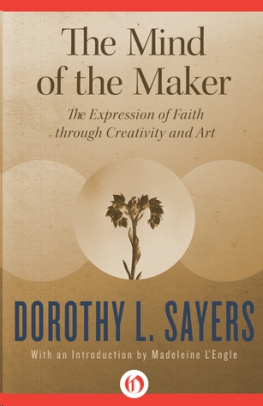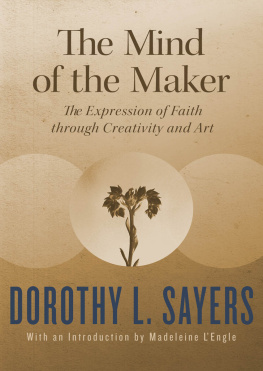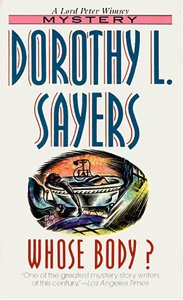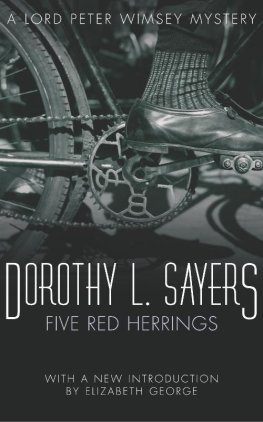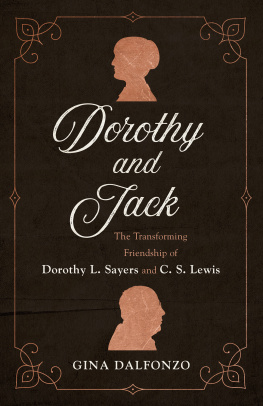
Dorothy L. Sayers
The Mind of the Maker
The Mind of the Maker
(1941)
by
Dorothy L. Sayers
(18931957)
Table of Contents
Preface
IN GLORIAM MAIOREM
SANCTI ATHANASII
QUI OPIFICIS AETERNI DIVINITATEM
CONTRA MUNDUM VINDICAVIT
ITEM
ECCLESIARUM BRITANNICARUM
PER DUCES SUOS CONTRA MUNDUM
OPERUM HUMANORUM SANCTITATEM
HODIE ASSERENTIUM
I propose to state the doctrine of the Trinity of God in doing which, if I shall be led on to mention one or two points of detail, it must not be supposed, as some persons strangely mistake, as if such additional statements were intended for explanation, whereas they leave the Great Mystery just as it was before, and are only useful as impressing on our mind what it is which the Catholic Church means to assert, and to make it a matter of real faith and apprehension, and not a mere assemblage of words.
JOHN HENRY NEWMAN: Sermon on the Trinity.
In the case of man, that which he creates is more expressive of him than that which he begets. The image of the artist and the poet is imprinted more clearly on his works than on his children.
NICHOLAS BERDYAEV: The Destiny of Man.
This book is not an apology for Christianity, nor is it an expression of personal religious belief. It is a commentary, in the light of specialised knowledge, on a particular set of statements made in the Christian creeds and their claim to be statements of fact.
It is necessary to issue this caution, for the popular mind has grown so confused that it is no longer able to receive any statement of fact except as an expression of personal feeling. Some time ago, the present writer, pardonably irritated by a very prevalent ignorance concerning the essentials of Christian doctrine, published a brief article in which those essentials were plainly set down in words that a child could understand. Every clause was preceded by some such phrase as: the Church maintains, the Church teaches, if the Church is right, and so forth. The only personal opinion expressed was that, though the doctrine might be false, it could not very well be called dull.
Every newspaper that reviewed this article accepted it without question as a profession of faithsome (Heaven knows why) called it a courageous profession of faith, as though professing Christians in this country were liable to instant persecution. One review, syndicated throughout the Empire, called it a personal confession of faith by a woman who feels sure she is right.
Now, what the writer believes or does not believe is of little importance one way or the other. What is of great and disastrous importance is the proved inability of supposedly educated persons to read. So far from expressing any personal belief or any claim to personal infallibility, the writer had simply offered a flat recapitulation of official doctrine, adding that nobody was obliged to believe it. There was not a single word or sentence from which a personal opinion could legitimately be deduced, and for all the article contained it might perfectly well have been written by a well-informed Zoroastrian.
It is common knowledge among school-teachers that a high percentage of examination failures results from not reading the question. The candidate, presumably applies his eyes to the paper, but his answer shows that he is incapable of discovering by that process what the question is. This means that he is not only slovenly-minded but, in all except the most superficial sense, illiterate. Teachers further complain that they have to spend a great deal of time and energy in teaching University students what questions to ask. This indicates that the young mind experiences great difficulty in disentangling the essence of a subject from its accidents; and it is disconcertingly evident, in discussions on the platform and in the press, that the majority of people never learn to overcome this difficulty. A third distressing phenomenon is the extreme unwillingness of the average questioner to listen to the answera phenomenon exhibited in exaggerated form by professional interviewers on the staffs of popular journals. It is a plain fact that ninety-nine interviews out of a hundred contain more or less subtle distortions of the answers given to questions, the questions being, moreover, in many cases, wrongly conceived for the purpose of eliciting the truth. The distortions are not confined to distortions of opinion but are frequently also distortions of fact, and not merely stupid misunderstandings at that, but deliberate falsifications. The journalist is, indeed, not interested in the facts. For this he is to some extent excusable, seeing that, even if he published the facts, his public would inevitably distort them in the reading. What is quite inexcusable is that when the victim of misrepresentation writes to protest and correct the statements attributed to him, his protest is often ignored and his correction suppressed. Nor has he any redress, since to misrepresent a mans statements is no offence, unless the misrepresentation happens to fall within the narrow limits of the law of libel. The Press and the Law are in this condition because the public do not care whether they are being told truth or not.
The education that we have so far succeeded in giving to the bulk of our citizens has produced a generation of mental slatterns. They are literate in the merely formal sensethat is, they are capable of putting the symbols C, A, T together to produce the word CAT. But they are not literate in the sense of deriving from those letters any clear mental concept of the animal. Literacy in the formal sense is dangerous, since it lays the mind open to receive any mischievous nonsense about cats that an irresponsible writer may choose to printnonsense which could never have entered the heads of plain illiterates who were familiar with an actual cat, even if unable to spell its name. And particularly in the matter of Christian doctrine, a great part of the nation subsists in an ignorance more barbarous than that of the dark ages, owing to this slatternly habit of illiterate reading. Words are understood in a wholly mistaken sense, statements of fact and opinion are misread and distorted in repetition, arguments founded in misapprehension are accepted without examination, expressions of individual preference are construed as oecumenical doctrine, disciplinary regulations founded on consent are confused with claims to interpret universal law, and vice versa; with the result that the logical and historical structure of Christian philosophy is transformed in the popular mind to a confused jumble of mythological and pathological absurdity.
It is for this reason that I have prefixed to this brief study of the creative mind an introductory chapter in which I have tried to make clear the difference between fact and opinion, and between the so-called laws based on fact and opinion respectively.
In the creeds of Christendom, we are confronted with a set of documents which purport to be, not expressions of opinion but statements of fact. Some of these statements are historical, and with these the present book is not concerned. Others are theologicalwhich means that they claim to be statements of fact about the nature of God and the universe; and with a limited number of these I propose to deal.
The selected statements are those which aim at defining the nature of God, conceived in His capacity as Creator. They were originally drawn up as defences against heresythat is, specifically to safeguard the facts against opinions which were felt to be distortions of fact. It will not do to regard them as the product of irresponsible speculation, spinning fancies for itself in a vacuum. That is the reverse of the historical fact about them. They would never have been drawn up at all but for the urgent practical necessity of finding a formula to define experienced truth under pressure of misapprehension and criticism.
Next page
